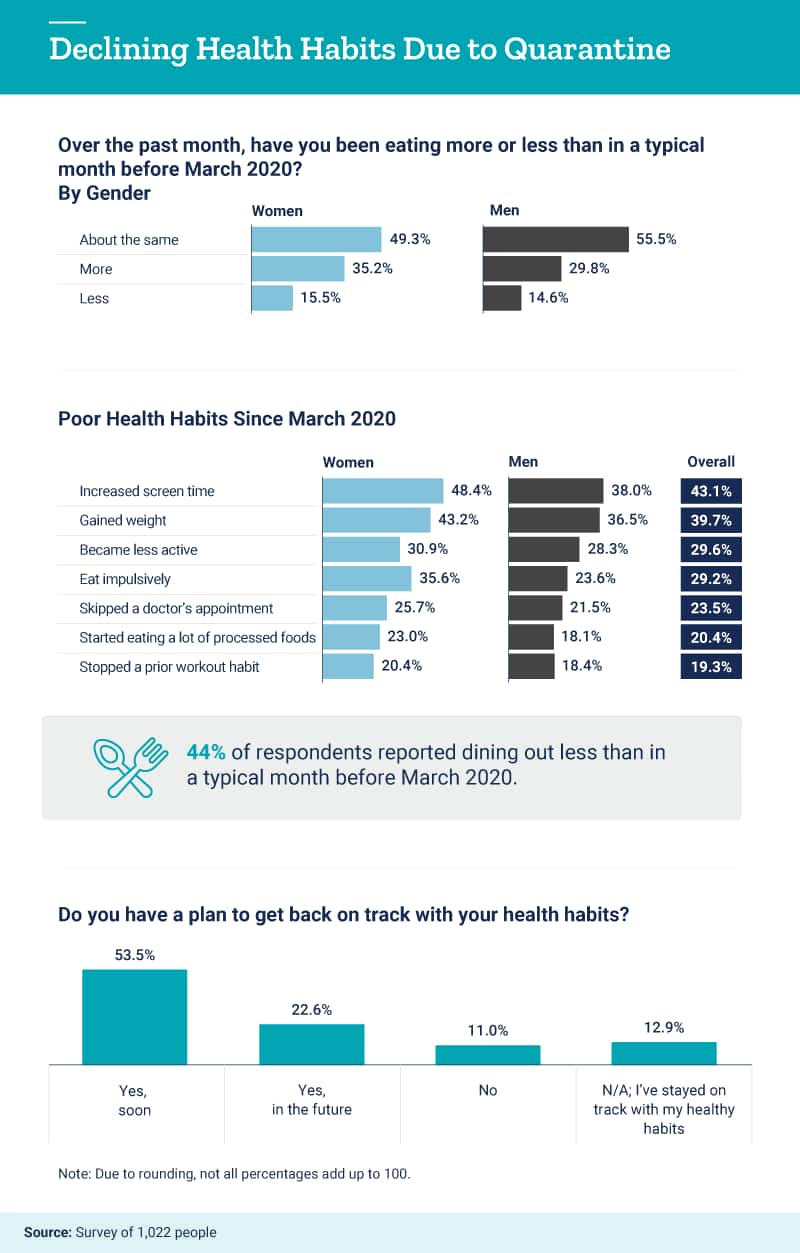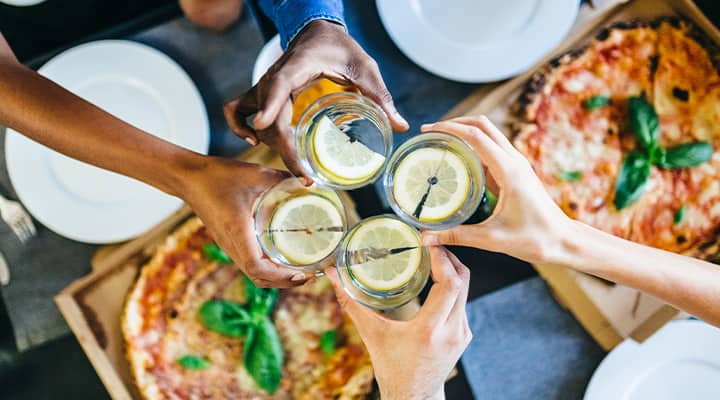
How Have Health Habits Changed During Quarantine?
Published: December 2020
For decades, most of us have insisted that we would be healthier if we just had a little more time to spend on exercise, meal prep, meditation and other self-care activities. It was the daily grind that was bringing us down—how could we accomplish any of our goals, after all, while also trying to juggle a long commute to a busy job, family responsibilities and a buzzing social life? Sure, every January, there's that collective push towards self-improvement, but according to a study by the Journal of Clinical Psychology, more than half of people who make New Year's resolutions give them up within six months.
But then, the unique circumstances of life in quarantine have called our bluff. Finally, we do have the time to work on our personal goals. Thanks to lockdowns, we don't even have the temptations of, say, a wedding dinner buffet to detract us from eating well. Plus, striving to be your best is even more critical, since healthier people are faring better in this global health crisis than those who have pre-existing conditions, according to the Centers for Disease Control and Prevention. On the other hand, the anxiety of living through a global health crisis can make it harder to focus on goals. Figuring out how to hold a perfect plank might seem a little frivolous, as we support mourning friends and family members.
At Life Extension, we wanted to learn how people's quest for a healthier lifestyle changed during the past months. We asked more than 1,000 American adults about their habits and how their mental health, sleep patterns and sexuality have changed this year. Read on for surprising insights on how the ways we pursue wellness have changed —for better, and in some cases, for worse.

More than a third of respondents cancelled their gym memberships. But people have indeed increased how often they are exercising, with more than half of those surveyed saying they work out more at home than they did previously.
Close to 40 percent purchased some home fitness equipment to keep up some of the activities they did at the gym. It might be a long time before many of us are packing up our towels, water bottles and lifting gloves since more than 60 percent of respondents don't plan to reactivate their gym memberships in the foreseeable future.
Wherever Americans are working out, though, one thing is clear: these unique times have made fitness a higher priority. More than half of those surveyed say they are more concerned about their physical health than previously, and they are taking action to improve their fitness levels. People are taking to the streets to get in their steps, with walking and running among the two most popular new exercise routines. What's everyone listening to on their Air Pods as they amble about the neighborhood? More than 40 percent of respondents have downloaded a fitness app to get some virtual guidance and inspiration.

While we're collectively doing better when it comes to our physical fitness, our emotional health has been suffering. Women, in particular, are bearing the brunt of it, with close to half, or 47%, saying that they feel more stressed than they did previously, a full 10 percentage points more than their male counterparts.
Compounding matters, 20% of respondents stopped seeing their therapist since March, leaving them to more or less fend for themselves emotionally. The most common ways people have sought to deal with the increase in stress are not watching the news, connecting with loved ones and goal setting—perhaps explaining why, indeed, Americans have been crushing those fitness goals.
Being laid off or furloughed compounds people's stress levels. Almost half, or 49%, of people who lost their jobs, reported being more concerned about their mental health than before this crisis, compared to 38% of those whose employment status hasn't changed.

Spending so much time indoors at home certainly caused some forced togetherness for people living with a spouse or romantic partner, so how did all of that alone time impact their relationships? Intriguingly, those who had lost their jobs felt more emotionally connected to their partners than those who did not become unemployed; conceivably, being a soft shoulder to cry on brought couples closer together.
Regardless of job status, more than 43% felt a closer connection to their partners during this time period than they did previously, while nearly 48% felt the same, and for about 9%, the stress made their relationships worse. For those who said their libido was low previously, more than 60% said they became even less interested in sex.
Almost a third of parents with children living in their homes had an increase in libido; might there be a baby boom as a result? Empty nesters reported a 12% increase in libido compared to their sex drive in months past—not nearly as much of a boost as their younger counterparts. Still, clearly, cupid's bow has been hitting cohabitating parents of all ages.

The quarantine baking trend certainly has impacted what we've been eating--and how much we weigh. Both women and men reported eating more in recent months, with close to 40% of all respondents showing they have gained weight. Since dining out is down—a whopping 44%—it's likely that the additional calories are coming from food eaten at home.
Stress eating is a genuine phenomenon, but fortunately, there are several healthy foods to eat to improve your mood.
The vast majority of people who are unhappy with their eating habits and their weight gain have a plan to get back in shape.
Begin Your Wellness Journey Today
While half of your Instagram feed may be full of people who have spent the past months getting to their goal weight, running a full marathon in their backyard, or finally beginning the habit of journaling, don't feel bad if you've become less healthy since being in quarantine started. Living through a global crisis is stressful and isolating.
But you don't have to experience this alone. Reach out to Life Extension's team of Wellness Specialists today. You can share your health goals, and our doctors, naturopaths, registered dieticians and other health experts can help you get on track today, at no cost to you.
Methodology and Limitations
We surveyed 1,022 people, exploring how their personal habits have changed since being in quarantine. Of our respondents, 48% were women, and 52% were men. The average age of respondents was 39, with a standard deviation of 10.
For short, open-ended questions, outliers were removed. To help ensure that all respondents took our survey seriously, they were required to identify and correctly answer an attention-check question.
These data rely on self-reporting by the respondents and are only exploratory. Issues with self-reported responses include but aren't limited to exaggeration, selective memory, telescoping, attribution, and bias. All values are based on estimation.
Fair Use Statement
Know someone who can relate to the information in this article? We invite you to share this content for noncommercial use. We just ask you to link back to this page so the authors can receive the credit they deserve and readers can enjoy the full study.
References
- Clifford, Catherine. "Why everyone is #quarantinebaking their way through the coronavirus pandemic." CNBC, March 2020, https://www.cnbc.com/2020/03/27/coronavirus-why-everyone-is-baking-their-way-through-the-pandemic.html
- Norcross, John C. "Auld Lang Syne: Success Predictors, Change Processes, and Self-Reported Outcomes of New Year's Resolvers and Nonresolvers." Journal of Clinical Physchology, April 2002, https://www.researchgate.net/publication/11443909_Auld_Lang_Syne_Success_Predictors_Change_Processes_and_Self-Reported_Outcomes_of_New_Year's_Resolvers_and_Nonresolvers
- "People With Certain Medical Conditions." Centers for Disease Control and Prevention, Updated October 2021, https://www.cdc.gov/coronavirus/2019-ncov/need-extra-precautions/people-with-medical-conditions.html
Always be in the know!
Access the latest deals, wellness news, expert health tips & more!




